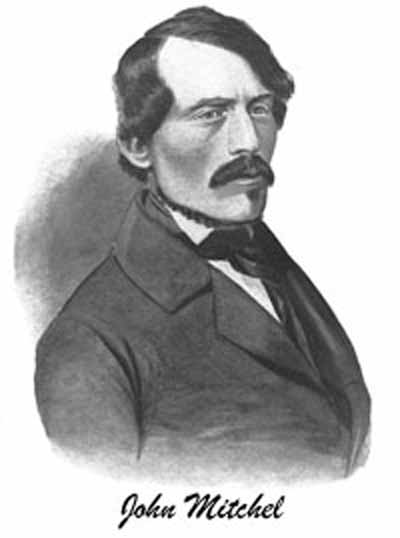JOHN MITCHEL - the Irish nationalist icon and journalist who championed Irish liberty but was also an American slavery apologist - continues to prove divisive right up to the present day.
Following his arrest in Ireland under the treason felony act in 1848, he was transported to Van Diemen’s Land, from where he escaped to the United States in 1853.
This divisiveness was a latter construct by those seeking to evaluate Mitchel’s ideals through a modern lens.
Mitchel, who positioned himself as the true inheritor of the Republican ideals of the Society of United Irishmen of 1798, founded his controversial views on race in Ireland and transferred them to an American arena when he found himself a refugee in the new world.
Mitchel’s journalism in his United Irishman newspaper ran from February 12, 1848 for sixteen weekly editions until May 27 of the same year.
The paper was based in Dublin’s Trinity Street - symbolically very close to Dublin Castle - to illustrate the challenge it was intent on posing to the British system in Ireland.
With a readership of over 5,000 the paper certainly impacted significantly upon the then radical journalistic landscape of Ireland before being shut down by the British authorities after Mitchel’s arrest in 1848.
In seeking to unite the Protestants of the North of Ireland with their Catholic counterparts in the south Mitchel – who was born in Derry but raised in Newry - remained true to the Republican ideals of the United Irishmen.
He wrote an “exact half century has passed away since the last holy war waged in this island to sweep it clear of the English name and nation. We differ from the illustrious conspirators of Ninety-Eight not in principle no not an iota”.
In fulfilling the vision of Wolfe Tone in seeking to unite Catholic and Protestant under the common name of Irishman, Mitchel challenged what for him was the root of all evil in Ireland - the British Empire.
He impressed upon his fellow northern Protestants that neither Irish Catholics nor Catholicism had threatened their interests. He wrote: “The seven sacraments are to be sure very dangerous, but the quarter acre clause touches you more nearly.”
Mitchel’s rejection of sectarianism between Protestant and Catholic Irishmen as a tool of British conquest further cements his devotion to the Republican ideals of 1798.
Whilst adopting the Republican principles of religious unity as a weapon to challenge British Imperialism in Ireland, he is cognisant of the difficulty it presents.
“Religious hatred has been kept alive in Ireland longer than anywhere else in Christendom just for the simple reason that Irish landlords and British statesmen found their own account in it.”
Mitchel preached separatist republican ideas that were rooted in his rejection of the Famine as a natural disaster as opposed to an act of genocide on the part of the British to exterminate the Irish race.
His guiding principle throughout remained that nothing good could ever come from the British Government’s relationship with Ireland.
Prior to Mitchel in the pages of the United Irishman most Young Irelanders dealt with 1798 purely in heroic romantic terms.
In John Mitchel’s worldview the political dimension of their vision was of significant value.
Mitchel exhibited none of the restraint of his Young Ireland colleagues when speaking of the 1798 rebels in hushed tones for fear of inciting division.
He championed their relevance most obviously in the naming of his paper and further with the Republican ideals of liberty, equality and fraternity emblazoned proudly on the mast head.
Further he contested their denial in their Irish homeland.
“America has raised over some of them columns of stone, France has given others mausoleums, the names of hundreds decorate the battlefields of Europe even in distant Venezuela a young Republic tends the graves of the United Irish. Shall home be the only spot on earth ungrateful?”
The political aims of the United Irish rebels to banish British rule from Ireland was the central theme of Mitchel’s journalism in the United Irishman in 1848.
However, Mitchel’s controversial concept of race and racial doctrine was also formed and represented in the United Irishman newspaper of that same year.
His views were a product of his Irish experience, consisting of the Republican ideals of martial citizenship espoused by the United men combined with the ideals of Thomas Davis regarding the distinct ancient Irish race.
In attempting to win over the Protestants of the north Mitchel alerts them to the character of the Irish race, suggesting: “You little know the history and sore trials of this ancient Irish race.”
The Irish race occupy the upper echelons of Mitchel’s racial hierarchy.
The Irish race, in Mitchel’s view, is too noble to endure the suffering cast upon it by the British Empire.
The depiction of the Irish race as enslaved by the British Famine system forms a central tenet of Mitchel’s concept of race as presented in the United Irishman.
This is true both in terms of his thinking at this point and the future controversial expression of his racial ideology.
Addressing the British viceroy, the Earl of Clarendon in the United Irishman, Mitchel describes him as “the official representative of foreign dominion in our enslaved island”.
In casting the Irish race as oppressed by British tyranny and arguing their righteousness in rising from their bondage Mitchel’s racial ideals come to the fore.
Laissez-faire British capitalism lay at the heart of the exploitation of the Irish race in Mitchel’s view. He states: “I hold that the meaning and sole object of that Government is to make sure of a constant supply of Irish food for British tables Irish wool for British backs and Irish blood and bone for British armies.”
 John Mitchel held controversial views on slavery
John Mitchel held controversial views on slaveryYet John Mitchel’s concept of race was to prove divisive and controversial in its American expression.
Following his arrival in America after his escape from Van Diemen’s land – the name formerly given to what is now known as the island of Tasmania in Australia - his racial views adapted to their new American environment.
Mitchel’s racial hierarchy, with the ancient Irish race at the apex, now also contained the black slave at the bottom.
Significantly Mitchel articulated his defence of slavery in the United Irishman of 1848.
In speaking of the Republican ideals of citizenship, he argued “that every man except a born slave who aspires only to beget slaves and die a slave ought to have arms and practice the use of them”. In his view a slave was not worthy of bearing arms and furthermore a slave could aspire to being no more than a slave and his support for slavery in America owed much to his fear regarding the nature of society without it.
Much of this fear revolved around the potential for the dissolution of American society, such as had occurred during the Famine in Ireland.
Ultimately, Mitchel’s United Irishman newspaper represented a radical republican journalism the like of which had not been seen in Ireland since the writings of the United Irishmen in the 1790s.
Through his writing Mitchel cast himself as the true inheritor of the Republican legacy of the Society and adopted – more fully than any other – its political ideals.
Yet his controversial racial ideology was also formed at that same time - in the Famine-ridden Ireland of the 1840s .
That is the lens through which Mitchel interpreted the world, particularly following his arrival in America, and is that which contributed much to his indefensible position on slavery.
Limerick based David Collopy is a third year PhD candidate in the Department of History at Mary Immaculate College at the University of Limerick. The title of his PhD is the Transnational Ideology of John Mitchel.

